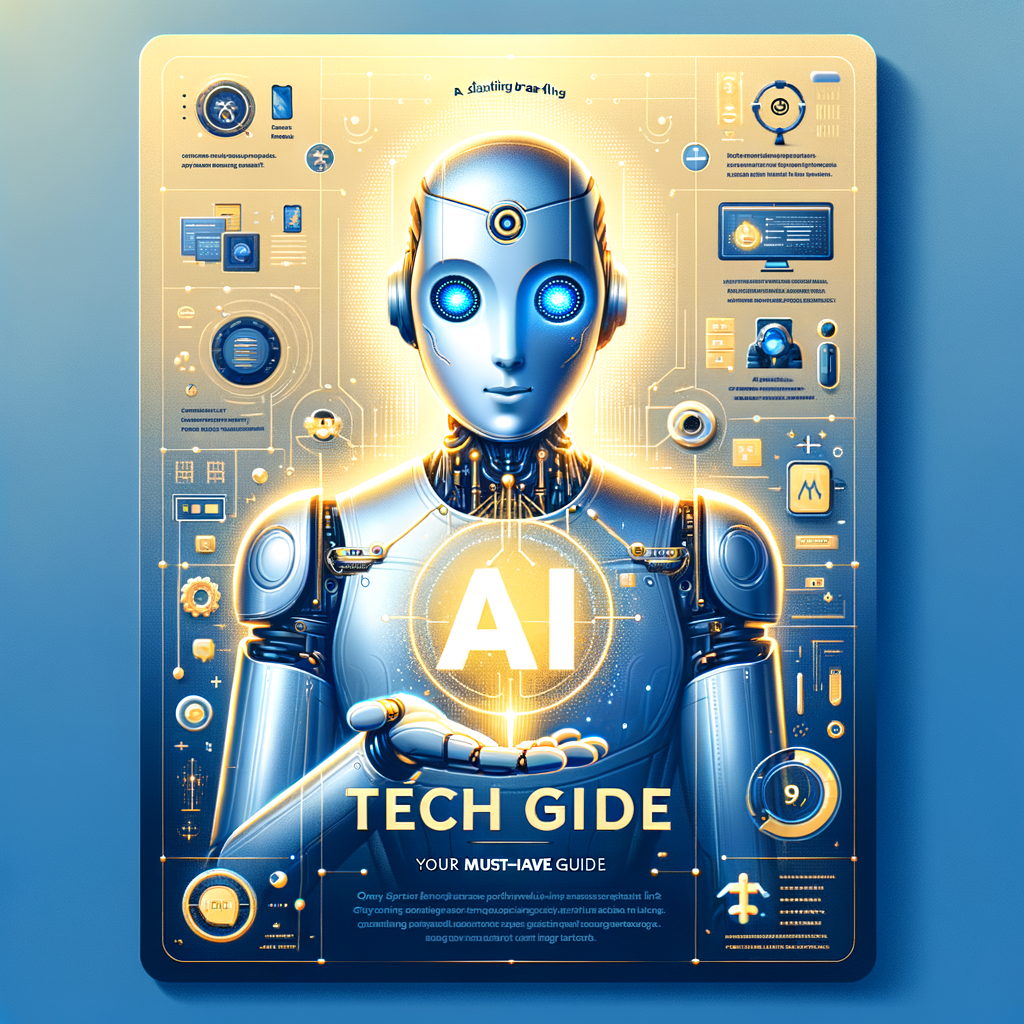
AI For Stunning Brand Taglines: Your Must-Have Guide
- Understanding the Power of Taglines
- The Basics of a Good Tagline
- Clarity
- Memorability
- Connection
- How AI Enhances Tagline Creation
- Data-Driven Insights
- Rapid Prototyping
- Enhancing Creativity
- Tools for AI-Powered Tagline Generation
- Pros and Cons of Using AI for Taglines
- Pros:
- Cons:
- Crafting Your Tagline with AI
- Define Your Brand Values
- Choose the Right Tool
- Plug in Your Keywords
- Review and Refine Suggestions
- Test Your Favorites
- Case Studies: Successful Taglines
- 1. Nike: “Just Do It”
- 2. Apple: “Think Different”
- 3. M&M’s: “Melts in Your Mouth, Not in Your Hand”
- Common Mistakes to Avoid
- Overcomplicating the Message
- Ignoring Your Audience
- Rushing the Process
- Tips for Testing Your Tagline
- A/B Testing
- Social Media Polls
- Focus Groups
- The Future of AI and Tagline Creation
- Integration with Brand Strategy
- Enhanced Personalization
- Conclusion
- FAQs
- 1. What is a tagline?
- 2. How long should a tagline be?
- 3. Can I create a tagline without using AI?
- 4. Should my tagline include my brand name?
- 5. Are there specific keywords I should use in a tagline?
- 6. How can I test the effectiveness of my tagline?
- 7. Is it necessary to change my tagline over time?
- 8. What are some famous examples of taglines?
- 9. How can I ensure my tagline is unique?
- 10. Can AI replace human creativity in tagline development?
- References
Understanding the Power of Taglines
Creating a memorable brand tagline can make a significant impact on how your audience perceives your brand. A tagline encapsulates the essence of your brand in just a few words. It should resonate with your target audience while reflecting your brand’s mission and values. But what if you could harness the power of artificial intelligence (AI) to craft that perfect tagline?
AI can analyze vast amounts of data and identify patterns that help generate compelling taglines. By leveraging AI’s capabilities, brands can skip the brainstorming blocks and find catchy phrases that stick. In this guide, you’ll discover how AI can transform your tagline creation process and help you shine brighter in a crowded marketplace.
The Basics of a Good Tagline
Not all taglines are created equal. A strong tagline often includes three essential elements: clarity, memorability, and connection.
Clarity
Your tagline should be straightforward. Avoid complex language or jargon that may confuse your audience. The best taglines communicate your brand’s purpose in a clear, engaging manner. For example, Nike’s “Just Do It” inspires action without being wordy.
Memorability
Memorable taglines often have a catchy rhythm or play on words. Alliteration, rhyme, or even humor can increase recall. Think of McDonald’s “I’m Lovin’ It.” The phrase is short, memorable, and brings a positive feeling.
Connection
Ultimately, your tagline should connect emotionally with your audience. It should resonate with their needs, desires, or values. A successful tagline evokes feelings that align with your brand’s image, ensuring it stays top-of-mind when consumers make choices.
How AI Enhances Tagline Creation
AI changes the game by providing insights and ideas that humans may overlook. Here’s how AI can enhance tagline creation:
Data-Driven Insights
AI can analyze market trends, consumer behavior, and social media sentiment to suggest relevant taglines. This insight helps craft messages that appeal more directly to your target audience.
Rapid Prototyping
AI algorithms can generate numerous tagline options within minutes. This speed allows you to explore a vast array of ideas quickly and makes the brainstorming process far more efficient.
Enhancing Creativity
Though AI lacks human emotion, it can generate creative combinations of words that spark ideas. Sometimes, unexpected phrases can lead to a perfect tagline. Think of AI as a tool to amplify your creativity.
Tools for AI-Powered Tagline Generation
Several AI-driven tools can help simplify your tagline development process. Below is a list of some of the most popular options you can consider:
| Tool Name | Description | Price Range |
|——————|————————————————————–|——————-|
| Copy.ai | Generates slogans with different tones and styles | Free to $49/month |
| Writesonic | AI-based copywriting tool that helps create taglines easily | Pricing varies |
| Jasper | Advanced AI that produces creative content | From $29/month |
| SloganGenerator | Free online tool to generate simple taglines | Free |
| NameSnack | Offers brand name and tagline ideas based on keywords | Free to $39 |
Pros and Cons of Using AI for Taglines
Like any tool, using AI for tagline creation comes with its benefits and drawbacks.
Pros:
– Speed: AI can produce options quickly, saving precious time.
– Data-Driven: It relies on analytics to inform suggestions.
– Diversity: Options from AI can range widely, offering variety.
Cons:
– Lack of Emotion: AI may not fully capture the emotional nuances.
– Generic Suggestions: Sometimes, outputs may feel cookie-cutter.
– Dependence on Input: Quality relies on the provided data.
Crafting Your Tagline with AI
When you’re ready to create your tagline using AI, follow these steps to streamline the process.
Define Your Brand Values
Before engaging with AI, clarify what your brand stands for. Your core values will guide the AI suggestions. Write down adjectives that best describe your brand, such as “innovative,” “friendly,” or “reliable.”
Choose the Right Tool
Select an AI tool that aligns with your needs. If you want creative freedom, focus on tools like Copy.ai or Jasper. For quick slogan generation, SloganGenerator can be invaluable.
Plug in Your Keywords
Most AI tools will ask for specific keywords related to your brand. Input the values, mission, and target audience to ensure the AI understands your context.
Review and Refine Suggestions
Once the AI generates taglines, review the options critically. Identify phrases that resonate, but don’t hesitate to ask for more variations if needed. This step ensures you reflect your brand accurately.
Test Your Favorites
After narrowing down your choices, test your favorites. Share them with a focus group or colleagues. Gather feedback to see which taglines resonate the most. Sometimes, the insights from real people are invaluable.
Case Studies: Successful Taglines
Learning from successful brands can inspire your own tagline creation. Here are a few case studies showcasing how brands used taglines effectively.
1. Nike: “Just Do It”
This tagline brilliantly conveys motivation and empowerment. It encourages action while perfectly aligning with the athletic brand’s ethos. “Just Do It” evokes strength and determination, making it timeless.
2. Apple: “Think Different”
Apple’s tagline perfectly captures its innovative spirit. It invites consumers to embrace creativity and originality. This phrase distinguishes Apple from competitors and reflects its brand values seamlessly.
3. M&M’s: “Melts in Your Mouth, Not in Your Hand”
With a clever play on words, this tagline highlights a unique selling point. It cleverly describes the product while keeping the audience engaged and entertained.
Common Mistakes to Avoid
Creating a tagline seems straightforward, but several common pitfalls can hinder your success. Here’s a look at common mistakes to avoid:
Overcomplicating the Message
Keep it simple. A tagline that tries to say too much can confuse the audience. Instead, focus on clarity and concise messaging.
Ignoring Your Audience
Your tagline should speak to your target audience. Ensure it aligns with their values and resonates emotionally; otherwise, it could fall flat.
Rushing the Process
Tagline creation deserves thoughtful consideration. Allow the appropriate time for brainstorming, revising, and testing your choices. Rushing can lead to missed opportunities for creativity.
Tips for Testing Your Tagline
Once you’ve created several potential taglines, testing them effectively can help you choose the best fit for your brand. Here are some effective strategies for testing:
A/B Testing
Use A/B testing to present two taglines to different segments of your target audience. Analyze which tagline resonates better based on engagement and conversion metrics.
Social Media Polls
Engage your audience directly by running polls on social media. Ask them to choose their favorite tagline and explain why it resonates with them.
Focus Groups
Gather a small group of people who match your target demographic. Share the taglines and encourage open discussion about their appeal, clarity, and connection.
The Future of AI and Tagline Creation
As AI technology continues to advance, expect even more innovative tools for tagline creation. AI will become more adept at understanding nuances, emotions, and impactful messaging.
Integration with Brand Strategy
The future may also see increased integration of AI into broader brand strategies. AI tools will not only assist in tagline generation but could also inform brand identity and marketing campaigns.
Enhanced Personalization
As consumer data becomes more granular, AI will be able to create highly personalized taglines that resonate on an individual level. Expect future taglines to speak directly to personal preferences and interests.
Conclusion
Brand taglines play a crucial role in establishing identity and connection with your audience. By embracing AI in the creation process, you can generate innovative and compelling taglines that resonate strongly with your target market. Remember to balance the creativity of AI-generated options with human insight and emotional resonance. This approach will help ensure your brand stands out even in a crowded marketplace.
FAQs
1. What is a tagline?
A tagline is a memorable phrase that embodies the essence of a brand, conveying its message and values.
2. How long should a tagline be?
Typically, a tagline should be short and sweet, ideally no more than 5-7 words.
3. Can I create a tagline without using AI?
Absolutely! Many brands develop taglines through brainstorming sessions, customer input, or creative writing without AI.
4. Should my tagline include my brand name?
Including your brand name can enhance recognition, but it’s not necessary if the tagline itself conveys your brand’s identity.
5. Are there specific keywords I should use in a tagline?
Keywords should reflect your brand’s values, mission, and target audience. They should also convey the primary message you want to communicate.
6. How can I test the effectiveness of my tagline?
You can test effectiveness through A/B testing, social media polls, or focus groups to gather feedback from your target audience.
7. Is it necessary to change my tagline over time?
As brands evolve, updating taglines to reflect new values or market strategies can keep your messaging relevant.
8. What are some famous examples of taglines?
Some famous examples include Nike’s “Just Do It,” Apple’s “Think Different,” and M&M’s “Melts in Your Mouth, Not in Your Hand.”
9. How can I ensure my tagline is unique?
Conduct thorough research to ensure it doesn’t closely resemble existing taglines. Use AI tools to generate variations that are fresh and distinct.
10. Can AI replace human creativity in tagline development?
No, while AI can provide valuable insights and suggestions, human creativity, emotional understanding, and brand insight remain essential for crafting effective taglines.
References
1. HubSpot
2. American Marketing Association
3. Neil Patel
4. Forbes
5. Copy.ai
6. Writesonic
Feel free to reach out if you have any further questions or need more information!

